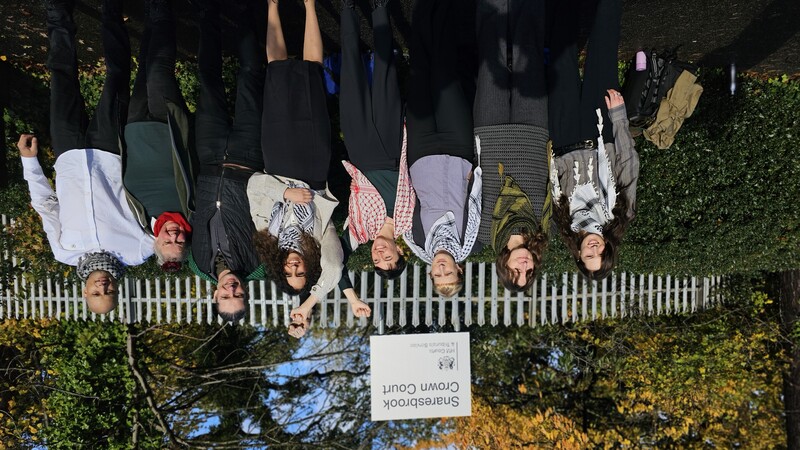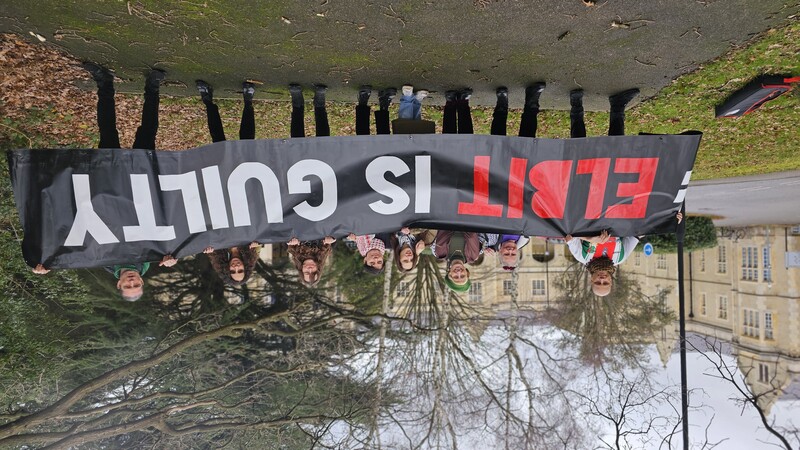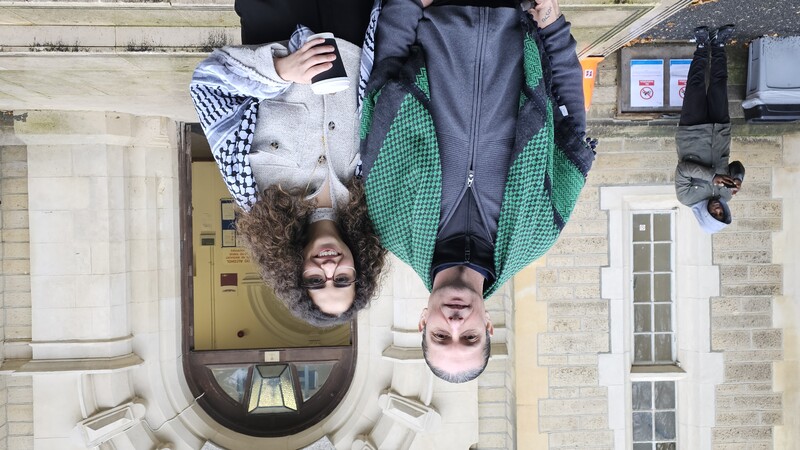The Electronic Intifada 9 January 2024

Members of Palestine Action gave evidence that weapons made by the firm Elbit Systems are being used to kill and maim Palestinians.
Palestine Action has a clear and simple goal: to shut down Israel’s leading weapons maker Elbit Systems.
That goal was stressed dozens of times during a recent trial in London’s Snaresbrook Crown Court.
Charges – mostly relating to alleged criminal damage – were brought against eight members of Palestine Action.
In December, a jury delivered a not guilty verdict on nine out of the 33 charges, along with a single guilty verdict against one of the defendants.
The jury did not reach a decision on the remaining charges. The UK’s Crown Prosecution Service (CPS) is supposed to come to a decision this month as to whether it will seek a retrial on the charges over which the jury was deadlocked.
The verdict was a partial victory for the activists – known as the Elbit Eight – who had targeted factories and offices owned or leased by the Israeli weapons firm in Britain. The group had also protested against Elbit’s landlord LaSalle Investment Management.
The trial took place amid Israel’s current war on Gaza. Nonetheless, the CPS tried to convince the jury that the role which Elbit plays in violence against Palestinians was irrelevant.
“You are not here concerned with the reasons why they were protesting,” Sally Hobson, the lead prosecutor, said as the trial began. “You are concerned with whether or not what they did was lawful.”
Hobson emphasized this point during her closing speech as well, repeatedly telling the jury that it must review the evidence “dispassionately.”
“This case is not about what has been going on in the Middle East for many, many years now,” she said. “This case is not about whether the business activities of Elbit are legitimate.”
Audrey Mogan, the attorney for Huda Ammori, a Palestine Action co-founder, challenged that claim. “Sorry, but that is exactly what this is about,” Mogan told the jury in response.
Mogan reminded the jury that Ammori had said she “honestly believed” that companies which rented property to Elbit would consent to Palestine Action’s protests and the resulting damage “if they knew the horrors taking place in Gaza, if they knew the company that they were leasing their property to was a vital component to making those horrors a reality.”
Gerard Pounder, the judge in the case, told the jury that “in order to be criminally liable, a person who damages another’s property has to act without a lawful excuse.”
“This is designed to protect people such as firemen who might have to break a door in order to gain access to another person’s property in order to deal with an incident and cannot find anyone who can give them permission to do so.”
Huda Ammori was one of the eight defendants, along with Richard Barnard, Robin Refualu, Genevieve Scherer, Caroline Brouard, Jocelyn Cooney, Emily Arnott and Nicola Stickells.

The Elbit Eight on the final day of the trial.
Although every defense lawyer reminded the jury that it must follow the law and reach a verdict based on the evidence, they also spoke of the historical role played by direct action protests in facilitating progress in the UK and elsewhere.
Rupert Bowers was the lawyer representing Richard Barnard, the other Palestine Action co-founder.
“Let me remind you, ladies, you wouldn’t have a vote or be sitting on the jury if it wasn’t for the Suffragettes,” Bowers told the jury during his closing speech. He was referring to how the votes for women movement resorted to tactics such as smashing windows on key London streets in the first few decades of the 20th century.
“Gentlemen, probably most of you wouldn’t be on the jury either,” Bowers added, noting that there was a time when “you had to own a certain amount of property to have a vote.”
“Times change, opinions change and sometimes it takes others to bring matters to our attention which change our views,” he added.
Genevieve Scherer is a 77-year-old retired social worker.
Her lawyer Will Hanson quoted from On Palestine, a book with contributions from the US intellectual Noam Chomsky and the Israeli historian Ilan Pappé.
In his introduction to that book, the French campaigner Frank Barat writes, “We do not become activists; we simply forget that we are. We are all born with compassion, generosity, and love for others inside us. We are all moved by injustice and discrimination.”
Hanson told the jury to consider that his client represents that very ethos. “Genny focuses on other people rather than on herself,” Hanson said, adding that when she undertook direct action against Elbit in the summer of 2020, she was focused on Palestine and that she remained concerned by the issue.
Scherer was acquitted of the two burglary charges brought against her.
“End British complicity”
One of Palestine Action’s main “targets,” the court heard, was 77 Kingsway, where Elbit had its London office. Some of the eight were seen on 77 Kingsway’s CCTV footage, as well as on video news reports produced by Real Media, in July and August 2020, entering the office building.
The activists threw red paint on the floor, spray painted and shouted slogans such as “shut Elbit down” and “your profits are covered in Palestinian blood” as security guards were seen confronting and at times grabbing them in the reception area.
“The idea was” and “still is” to “end British complicity with the Israeli apartheid regime,” Richard Barnard told the court.
He insisted that the “only criminals here are Elbit Systems,” a corporation “killing people for profit” and “committing genocide as we speak.”
Barnard explained that he was trying to “prevent war crimes” against the Palestinians, which are carried out by drones manufactured by Elbit and used by the Israeli military.
Elbit markets its products as “battle tested,” Huda Ammori told the court, because the people in Gaza are maintained as a “captive population.”
She said that Elbit provides “internationally banned” cluster munitions to Israel. The bank HSBC had divested from Elbit over its production of cluster bombs used by the Israeli military, following a sustained protest campaign directed at HSBC. She also told the court about the use of white phosphorus against Palestinians in Gaza, which burns through the skin and down to the bone.
“If it goes into your lungs it can cause lung cancer,” she said, adding that Israel won’t allow such victims to get permits to go to hospitals where they can be treated. “It makes the situation completely unlivable.”
Ammori, whose Palestinian father became a refugee in Iraq after Israel invaded the West Bank and Gaza in 1967, told the court about a UN report which noted that Israel’s drone fleet was heavily used in 2014 when the Israeli military “killed over 500 children” in around 50 days.
Ammori described how Israel uses Elbit’s Hermes 450 drone, the engines of which are made in Shenstone, near the English city of Birmingham, by the Elbit-owned firm UAV Engines. The drones are then used to kill “families, women, children,” she said.
Elbit’s Hermes 900 drone, “which is now on the global arms trade, was not released until it was tested on Gaza’s population,” Ammori said.
Crime against humanity
During her cross-examination of Ammori, the lead prosecutor Sally Hobson suggested that the allegations of war crimes committed by Israel are as of yet “unproven.”
“You only need to watch the news and read the reports to understand,” Ammori responded.
Hobson then asked Ammori whether she was aware of “attempted negotiations [by Israel] to try and bring about a peace deal” in 2020 and 2021.
“I’m not sure what negotiations you are referring to,” Ammori responded.
“The Palestinian people [have been] routinely oppressed for 75 years.” Ammori said. “Any suggestions that there are peace negotiations by the Israeli state [are false],” she added.
Anyone “can switch the TV on right now and see how they are massacring Palestinians,” she said.
“This is not just a war crime,” Ammori insisted, “it is genocide” a “crime against humanity.”
“Who supplies Hamas with their weapons?” Hobson asked Ammori.
“Not Elbit Systems,” Ammori retorted.
Ammori’s defense lawyer stood up and questioned the relevance of Hobson’s question on Hamas.
The judge noted that the question might not go anywhere but did not immediately try to stop it being raised. After Ammori said that she did not know who armed Hamas, the judge indicated that he expected Hobson to move on.
“Have you paid for the tens of thousands of pounds of damage caused during the action you took? If it doesn’t really matter, why haven’t you paid for them?” Hobson asked Ammori during her cross-examination.
“There has been no reparations for Palestinian homes, schools, lives and communities taken,” Ammori replied.
The protests carried out by Palestine Action were “not just a little bit of paint,” Hobson said to Ammori. “We’ve seen damage, destruction, disruption to people’s lives.”
“Most protests result in a degree of disruption in people’s lives,” Ammori responded. She noted that street protests also cause “disruption” before repeating her point that “this is paint we are talking about.”

Palestine Action co-founders Richard Barnard and Huda Ammori.
The jury was informed near the end of the trial that Elbit’s insurance company paid for the costs of repairing the Shenstone factory following Palestine Action’s protests there.
“I found out that Elbit Systems publicly advertise themselves as the ‘backbone’ of the Israeli military drone fleet,” Richard Barnard told the court. He added that he learned how, Elbit, which provides an estimated 85 percent of the Israeli military’s drone fleet and 85 percent of its land based equipment, also makes “butterfly bullets.”
Such a bullet is shot “ into your leg and then explodes” and the “only option is chop your leg.”
Barnard described how Israeli snipers shot so many unarmed Palestinians in Gaza in their knees and ankles during the Great March of Return, weekly protests during 2018 and 2019, that a large number of amputations were required.
Hundreds were killed and thousands were injured during the Great March of Return, the court was told.
Barnard, once accepted into the youth team for Swansea City – one of the biggest football clubs in Wales – became emotional when describing how an Israeli drone strike killed four cousins, aged 10 to 11, as they played football on the beach in Gaza in 2014.
It had been verified, Barnard noted, that an Elbit surveillance drone, the Hermes 450, had facilitated the massacre.
Barnard testified that he had been engaged in protests against Elbit around 2015, well before he co-founded Palestine Action with Huda Ammori.
He tried silent protests, using posters and banners, holding vigils and praying outside of their facilities.
“I wish from the bottom of my heart that [non-direct action protests] would work, but it don’t,” Barnard said. “Asking nicely or politely, even with a really good sign or song is not going to work, I’m afraid.”
Mohamed Elmaazi is a UK-based journalist, who contributes to numerous outlets including Jacobin, The Dissenter and Consortium News.





